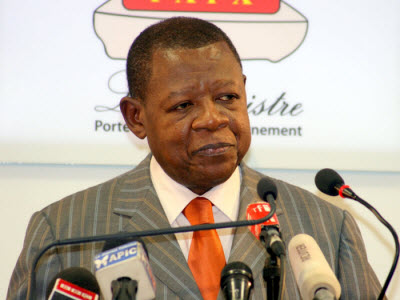
Information Minister and government spokesman Lambert Mende told reporters during a news conference in Kinshasa on Tuesday that there will only be a “statement.”
“We did not go [to Kampala] to negotiate and sign an agreement. We were told: come to Kampala, listen to your countrymen and answer them. We listened and our response will be in the statement that we are going to sign,” Mr. Mende said.
He added that the Congolese government “never intended to sign a peace deal with anybody” when it agreed to start peace talks with the rebels in Kampala, Uganda.
DR Congo's government agreed to hold talks with the M23 rebels in Kampala last year after they briefly occupied Goma, the North Kivu province’s capital city.
After nearly a year of on-and-off discussions, the talks were suspended again two weeks ago after the Congolese government refused to grant a complete amnesty or integrate into the army rebels who had committed war crimes or crimes against humanity.
The fighting then resumed. But by Tuesday morning the Congolese army had regained all territories that had been occupied by the M23 rebels for more than a year.
After losing their strongholds of Kibumba, Kiwanja, Rutshuru, and Bunagana, the rebels fled from their last hideouts on the hills of Chanzu and Runyoni overnight as government troops, backed by UN peacekeepers, were advancing towards their positions.
The political leader of the M23, Bertrand Bisimwa, released a statement saying that the rebel group was “ending its rebellion." But by then the few remaining rebels and the M23 military leader, Sultani Makenga, had either fled to Uganda or Rwanda.
“You all heard the news. The M23 said that it has ended its rebellion. So, there is no need to go and change this fact by recreating an M23 to sign an agreement with,” Mr. Mende said on Tuesday.
Related articles
- • DRC and Rwanda Sign Declaration of Principles for Peace in Eastern Congo (April 25, 2025)
- • European Union Sanctions Rwanda and M23 Officials over Congo Conflict (March 17, 2025)
- • Canada and Germany Impose Sanctions on Rwanda for Supporting M23 Rebels (March 4, 2025)
- • UK Suspends Financial Aid to Rwanda Over M23 Rebellion (February 25, 2025)
- • European Union Suspends Defence Consultations with Rwanda (February 24, 2025)
- • Tshisekedi Announces Government of National Unity and Calls for Unity Against M23 Rebels (February 23, 2025)
- • UN Security Council Calls on Rwanda to Stop Supporting M23 Rebels in DR Congo (February 22, 2025)
- • US Sanctions Rwanda's Minister James Kabarebe for Central Role in DR Congo Conflict (February 20, 2025)
- • Rwanda-Backed M23 Rebels Summarily Executed Children in Bukavu, UN Reports (February 19, 2025)
- • DR Congo Citizens Head to Polls to Elect President, Members of Parliament (December 20, 2023)
- • 'Deadly environment' plus 'political and social' obstacles hinder Ebola fight, Security Council hears (July 24, 2019)
- • Ebola outbreak declared an international Public Health Emergency (July 17, 2019)
- • Constitutional Court Declares Tshisekedi Winner of Presidential Election (January 19, 2019)
- • At least 30 dead after massacres in Ituri (March 2, 2018)
- • No elections in DR Congo in December without electronic voting machines: INEC (February 13, 2018)
- • DRC Seeks Arrest of Presidential Candidate Moise Katumbi (May 19, 2016)
- • Peacekeepers, Congo Army to Resume Joint Fight Against Rwandan Rebels (January 28, 2016)
- • Political tensions 'running high' in DR Congo ahead of 2016 elections (October 7, 2015)
- • UN Report Blames Ugandan Islamists for 237 Killings in DR Congo (May 14, 2015)
- • DRC Army Putting Pressure on FDLR (April 1, 2015)
- • Denis Mukwege Wins Sakharov Prize 2014 (October 21, 2014)
- • Violence in North Kivu Kills 21, Mostly Women, Children (October 18, 2014)
- • Kerry Calls on Kabila to Honor Constitution (May 4, 2014)
- • Death toll in Lake Albert boat accident rises to 251 (March 27, 2014)
- • U.S. sending more personnel to Uganda to hunt LRA leader Joseph Kony (March 24, 2014)
- • Death toll in Lake Albert boat accident rises to 108 people (March 24, 2014)
- • DR Congo Takes Chairmanship of COMESA at Summit in Kinshasa (February 26, 2014)
- • Bosco Ntaganda Attacked Civilians on Ethnic Grounds, ICC Prosecutor Says (February 10, 2014)
- • New DR Congo amnesty law welcomed by UN envoys (February 5, 2014)
- • Colonel Mamadou Ndala Is Killed in Ambush (January 2, 2014)







